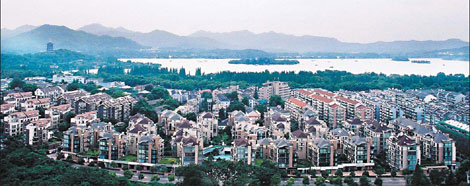|
|

An bird's-eye view of Hangzhou city. |
The saying goes: "In the sky, paradise is heaven, and on earth, it's Suzhou or Hangzhou."
Now, Hangzhou, celebrated as a popular tourist spot, aims to become a paradise for venture capital and private equity funds.
Hangzhou, the capital of Zhejiang province, plans to set up a 5 billion yuan fund to invest in industrial projects and a 560 million yuan venture capital fund to support hi-tech and Internet startups, according to a recent industry forum.
Cai Qi, Hangzhou mayor, said on the forum: "Five billion yuan is the target for the initial phase of the Qian Jiang Industrial Fund and the municipal government will continue to raise funds after completing the first phase. We warmly welcome global venture capitalists and private equity firms to participate in the fund."
The Qian Jiang fund will make Hangzhou the country's third city to launch a yuan-denominated government-backed industrial fund, in order to diversify risks and provide a source of low-cost funds for specific projects. The first two cities are Tianjin and Shanghai, which have won approval for 20 billion yuan industrial investment fund at the end of 2006 and earlier this year respectively.
The city has been in touch with more than 20 private equity houses that may become partners in the fund, according to Cai.
Some famous private equity firms, such as Softbank, Zero2IPO Capital, IDG and NEA, have already expanded their investments in Hangzhou. According to incomplete statistics, there are about 40 venture capitalists (VC) registered in Hangzhou, accounting for 90 percent of the total VC number in Zhengjiang province. The venture capitalists here mainly invest in software industry, advanced manufacturing, communications, clean energy and network industry.
The local government also plans to set up an equities exchange as an exit channel for investments by foreign venture capital and private equity funds.
Emulating Alibaba
"Now, we're looking for the next Alibaba and we believe there will be more Alibabas with the help of the government," Cai says.
Founded in 1999, Alibaba.com Ltd is based in Hangzhou and is China's largest e-commerce firm, which gained nearly 1 billion yuan net profit in 2007 and the all-year turnover exceeded 2 billion yuan. Alibaba.com's parent company also owns Taobao.com, China's biggest online retailer by revenue.
The local government plans to use 560 million yuan venture capital fund to support high-tech and Internet companies, aiming to build up companies that could emulate the success of Alibaba.com Ltd.
According to the survey report released by China industry e-commerce website, in 2007, a quarter of China's e-commerce websites are in Zhejiang, which make the province takes the lion's share of the e-commerce business in China. Yet, in Zhejiang, 70 percent of e-commerce websites gather in Hangzhou.
So far, there are about 300 e-commerce firms and thousands of e-commerce websites in Hangzhou. The city's e-commerce business realized 2.37-billion-yuan revenue in 2007, up 21 percent year-on-year, and contributed 1.24-billion-yuan tax, increasing 18 percent than last year.
In May, the China E-Commerce Association honored Hangzhou as the "capital of China's e-commerce business". Meanwhile, the local government set target to sharp the edge and drafted a three-year action plan.
According to the plan, by 2010, 95 percent of large-scale companies and half small-size companies in Hangzhou will use e-commerce business.
"We are making great efforts to be one of the 10 Alibaba.com Ltd," says Tian Ning, president with CHPANSHI.net. The companies' turnover has been tripled annually in the past three years.
The government in Hangzhou is also taking concrete measures to support e-commerce. Besides reducing the tax of e-commerce firms and on-line credit settlement fees, the government promises that it will put its mouth where its money is by "gradually" making purchases via the Internet.
"The government's favorable policy can be a driving force for developing e-business firms, but can't decide which companies can be the next Alibaba. It's up to the market to select the qualified companies," Chen Deren, chairman with Hangzhou E-Commerce Association, says.
Industry experts says, compared with well-developed countries and some metropolitan areas, such as the US and Shanghai, the e-commerce business in Hanghzou a lot of room to grow.
Some Wall Street analysts predict that the global turnover from e-commerce will realize $20,000 billion in 2020. In 20 years, about 70 percent of global business will be transacted via the Internet. |


